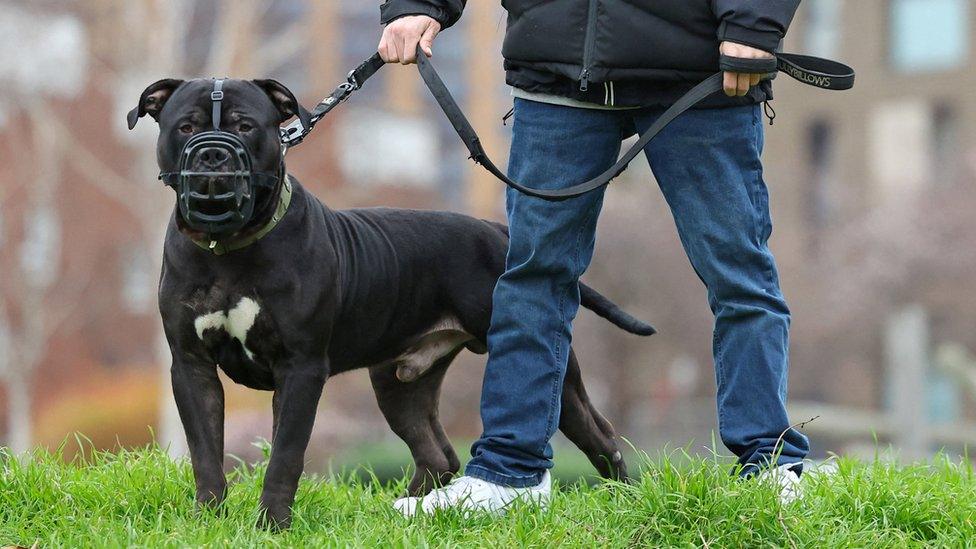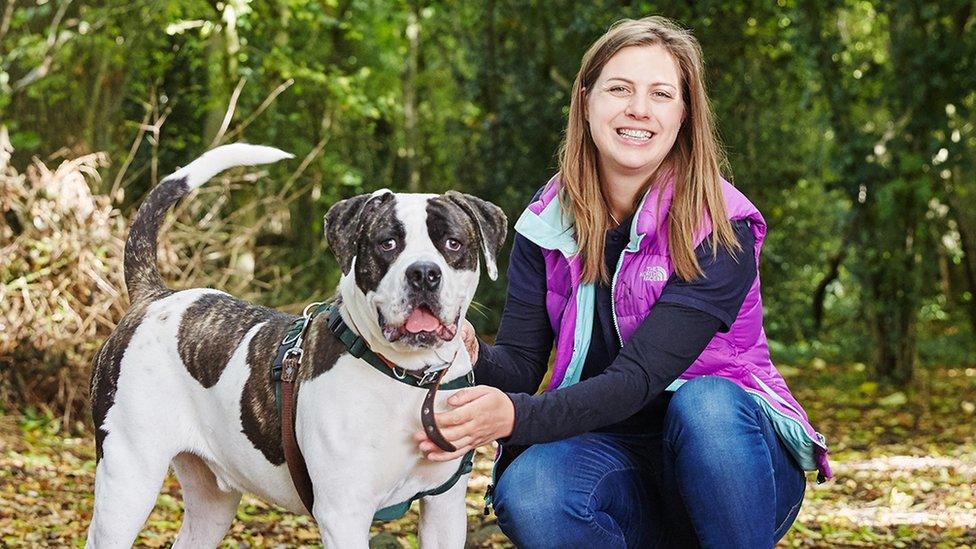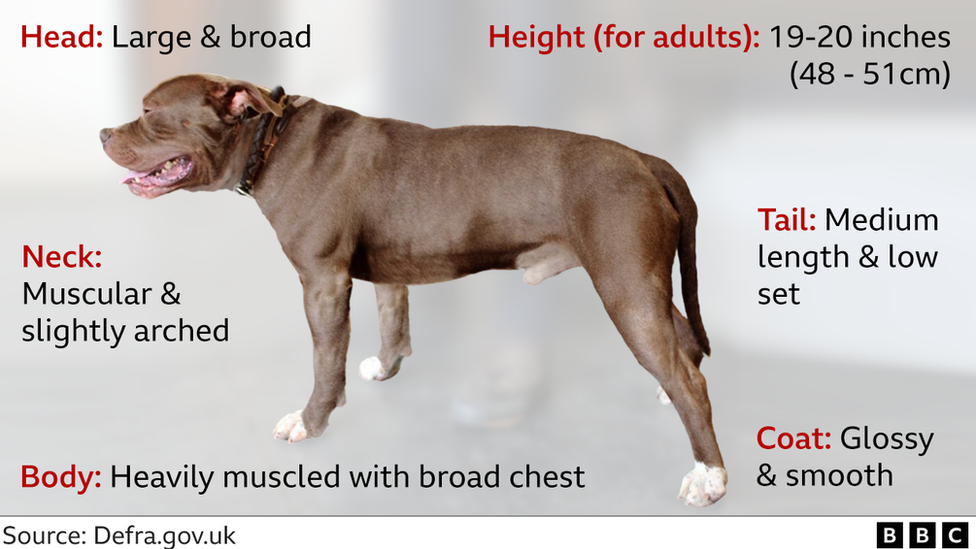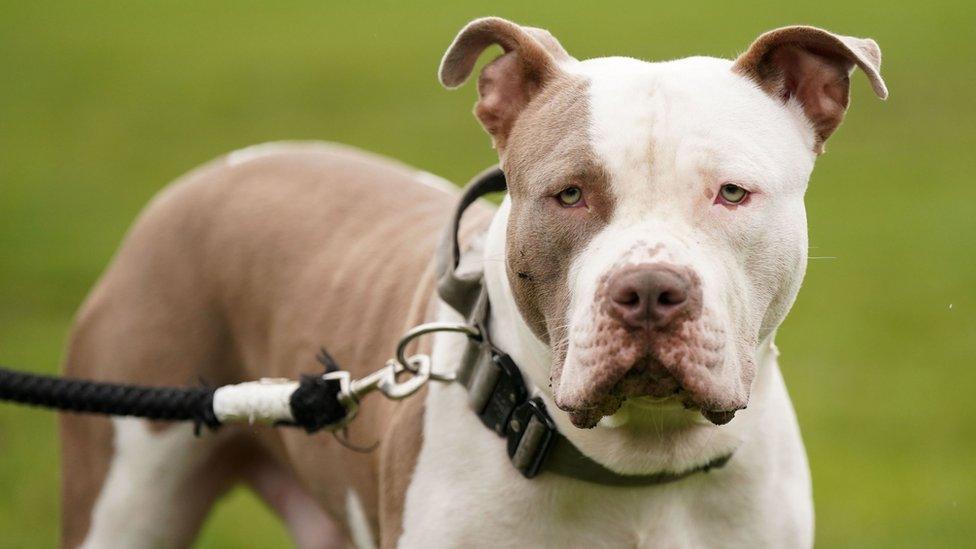Dog attacks: What can you do to protect yourself?
- Published

Registered American XL Bully dogs must now be kept on a lead and muzzled in public in England and Wales
Dog attacks in England and Wales have increased in recent years and while they remain rare, fears have grown due to serious and fatal attacks, such as that on 68-year-old Esther Martin earlier this month.
So is there anything you could do to protect yourself if faced with an aggressive dog?
The first thing to note is that despite a significant rise in the number of dog attacks recorded by police in England and Wales in the past five years, it is still an extremely rare event.
Not all attacks are reported to the police, but the latest data shows that in 2022 there were nearly 22,000 cases of out-of-control dogs causing injury. The estimated UK dog population is 11 million, external.
Deaths are even rarer. The government says 23 deaths have been caused by dog attacks since the start of 2021.
But if you were unfortunate enough to find yourself in such a situation, would there be any dos and don'ts?
"The worst thing you can do if you've got a dog that's rushing towards you is to run away," says animal behaviourist Rosie Bescoby.
"I know that's difficult when it's probably part of our flight instinct, but there's a risk of falling over."
The RSPCA also advises against running as it may encourage the dog to chase you, as well as screaming, which "can trigger a more predatory response", Rosie says.
Crossing your arms against your chest will make it harder for a dog to bite onto them or your sleeves, she says, and giving them as much space as possible can avoid confrontation.
"It's one of those situations where you want to try and get a barrier between the dog and the person as well," she said. "So if you can, get something to ram between them and then get the person behind a closed door."
If you are in the street or a park, a bench, a lamp post or a litter bin may serve as an adequate barrier, says the RSPCA. If cycling, you could use your bicycle.

Animal behaviourist Rosie Bescoby runs consultancy Pet Sense, and regularly shares her expertise in the media
In the event a dog does bite, "one of the worst things we can do is... try and prise the dog's mouth open", Rosie adds.
"If they've got a collar on, you can try grabbing the collar from the back of the neck and twisting it hard so that you're effectively cutting off air supply so it has to let go."
Ultimately though, in many cases Rosie believes "there's probably very little that could have been done" as those dogs were "absolutely" going to attack regardless.
Jane Williams, Secretary of the Animal Behaviour and Training Council (ABTC), agrees that creating distance or placing a barrier between you and the dog is the best course of action, but concedes it is not straightforward.
"You can't define or describe what the best thing is for all situations, because it's going to vary."
Few people know this better than Kerry Stevens from Eastbourne, who is still scarred psychologically after she was attacked by a pit bull cross-breed in 2014.

Kerry Stevens needed several operations following a dog attack
The attack happened when she went to drop off an item she had sold to a stranger online.
She was talking to the couple who lived at the home when a dog came out and knocked her to the ground.
"[It] ripped lumps of flesh off my legs, locked on, and the husband got it off me by punching it.
"Then he phoned the ambulance and sat on the dog. I crawled out into the street so that there was a barrier between me and the dog."
Kerry says there was nothing she could have done to protect herself.
"There was nowhere I could go, I tried going up the steps and it followed me and locked on.
"It was very, very difficult to not scream when something was latched on to you."
Kerry says had she had something to hand, she would have tried to use it as a "defence weapon", and insists that in future she would make sure she has her keys handy to "just stab the thing".
But as Ms Williams points out, "anything you try to do with an animal that's already aroused and showing aggression, which is confrontational, it's very unlikely to improve the situation".
When discussing dog attacks, the emphasis "really should be on being a responsible dog owner", she says, "taking care of your dog so that you know the dog and the people do not find themselves in that sort of situation".

Esther Martin was killed after trying to distract fighting XL Bully puppies, her daughter said
The RSPCA, the UK's largest animal welfare charity, advises fending the dog off rather than trying to fight back, external.
"Try to hold something like a briefcase, bag or coat between you and the dog. Very few dogs press home a serious attack and after a snap-bite they will be content that you are leaving," its guidance states.
If you know there are people within hearing distance, call to them for help, but do not scream or yell, it says.
"Stay on your feet and do not corner yourself. Continue to walk slowly away, backwards or sideways, looking down and sideways."
Imagining a dog attack may conjure images of being approached by a dog in public, perhaps in a park.
But a 2019 US study found the majority of dog bites happen in a home, external, and the dog is usually known to the victim, according to experts at the University of Liverpool, external.
Rosie believes more needs to be done than "just banning a certain type of dog... because how is muzzling and keeping these dogs [XL bullies] on the lead in public going to reduce the attacks in the home?
"Visitors and friends and family coming to the home are not protected."

The government published guidance to help identify XL bullies, which are not recognised as a specific breed by the UK Kennel Club
Ownership of American XL bully dogs in England and Wales is restricted under the Dangerous Dogs Act 1991.
Since 31 December, it has been against the law to sell, give away, abandon or breed from an XL bully, external.
From 1 February, it is a criminal offence to own an XL bully without an exemption certificate. Registered dogs must be kept on a lead and muzzled in public.
Police can seize unregistered dogs, and owners face a criminal record and an unlimited fine.

Are you affected by the issues raised in this story? Share your experiences by emailing haveyoursay@bbc.co.uk, external.
Please include a contact number if you are willing to speak to a BBC journalist. You can also get in touch in the following ways:
WhatsApp: +44 7756 165803
Tweet: @BBC_HaveYourSay, external
Please read our terms & conditions and privacy policy
If you are reading this page and can't see the form you will need to visit the mobile version of the BBC website to submit your question or comment or you can email us at HaveYourSay@bbc.co.uk, external. Please include your name, age and location with any submission.
Related topics
- Published12 February 2024

- Published12 February 2024